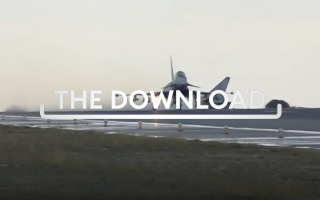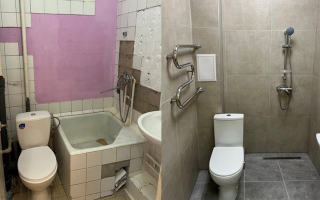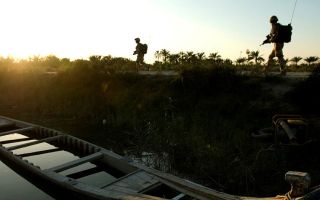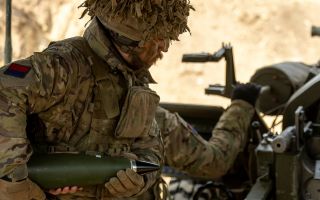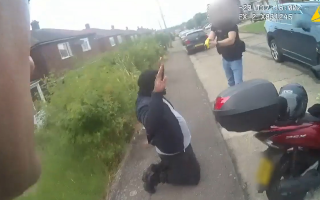Tri-Service
Foreign Secretary Defends UK Arms Sales To Saudi Arabia
Boris Johnson has claimed other Western countries would "happily supply arms" to Saudi Arabia without the same protections, should Britain suspend its sales.
The Foreign Secretary warned that suspending arms sales would "at a stroke" eliminate Britain's diplomatic influence on the Yemen conflict, in which the Saudi Arabian-led coalition has been accused of war crimes.
Labour and the SNP have called for an independent UN-led investigation into the allegations, while there have also been calls for Britain to suspend arms sales to Saudi Arabia while investigations take place.
Johnson's comments come after the publication of shocking pictures of starving Yemeni war victims in a number of major news outlets. There have also been reports of Saudi 'double tap' airstrikes that are reported to have targeted both civilian targets (such as a school and a funeral), as well as rescuers who come to the aid of victims.
In a sign of how contentious the issue is becoming in Britain, the Times has featured a picture of emaciated 18-year-old Saida Ahmad Baghili on its front page today.
It went on to say on its editorial page that Theresa May should follow Jeremy Corbyn's advice and withdraw British backing for Saudi membership of the UN Human Rights Council.
It reports that 90% of Yemeni food was imported before the war and that since March 2015, the Saudi-led Gulf coalition (made up of Saudi Arabia, Egypt, Jordan, Sudan, the UAE, Kuwait, Qatar, and Bahrain) has bombed and blockaded Yemen.
The alleged intention is to force Iranian-backed Houthi rebels out of the country. They ousted President Hadi last year, who has since fled to Saudi Arabia.
How the conflict in Yemen started
The conflict has now escalated to the point that 10,000 people have been killed, with civilians making up one-third of this total. A further 21 million people now rely on medical and food aid. Torben Due, who directs the World Food Program (WFP) in Yemen, has said:
"An entire generation could be crippled by hunger".
On the WTF's website, there is an urgent plea for donations to keep food aid going until January of next year.
The site also thanks national donors that have pledged support or made contributions to the Yemen food drive: Germany, the US, UK, UAE, and Saudi Arabia.
The US, Germany, and Britain are reported as having donated to Yemen $141,601,598 (£115,526,670), $22,253,381 (£18,152,615), and $4,170,429 (£3,401,686), respectively, over the course of this year.
The United Arab Emirates (UAE) have donated $13,613 (£11,105) to the WFP this year, but those funds are only listed as having gone to Syrian refugees in Jordan, Lebanon, Iraq, Turkey and Egypt.
Saudi Arabia has donated $51,916 (£42,360) to the programme this year, but data as to which countries this has gone to are currently unavailable.
Speaking in an opposition day debate on the crisis in Yemen, Mr Johnson said it was right that Saudi Arabia did its own investigation into the crisis in Yemen first, and resisted calls to suspend arms sales to them. He said:
"Be in no doubt that we would be vacating a space that would rapidly be filled by other Western countries who would happily supply arms with nothing like the same compunctions or criteria or respect for humanitarian law. And more importantly, we would at a stroke eliminate this country's positive ability to exercise our moderating, diplomatic and political influence on a crisis where there are massive UK interests at stake."
Mr Johnson also claimed shadow foreign secretary Emily Thornberry "substantially retreated" from the opposition's motion, specifically over whether to suspend weapons sales.
Meanwhile, Labour is facing opposition from its own MPs over the motion, with Labour's John Woodcock (Barrow and Furness) insisting Britain's involvement in the coalition must continue.
He suggested the withdrawal of support could lead to further civilian deaths in Yemen. He told Ms Thornberry:
"I agree with your calls for an independent investigation into this matter. Can you explain to me though why you feel that actually withdrawing the UK's support to the coalition - which is precisely focused on training Saudis to [be better able to be] in compliance with international humanitarian law, therefore our interventions, if they are effective, will create fewer civilian casualties - why you have insisted, despite a number of us asking, in keeping that in the motion making it very hard for many of us to vote for it?"
Ms Thornberry quoted Californian congressman Ted Lieu, in which he questioned if Saudi Arabia was either not listening to the US or did not care.
She later said there are major questions about the coalition's command structure. Ms Thornberry explained:
"All sides will have spoken to experts on the conflict who say there is essentially two coalition forces operating in Yemen. One, from the capital which carries out pre-planned operations based on strong intelligence under the direction of the Americans and UK advisers. And the other - this answers [Mr Woodcock's] point - there is another centre operating out in southern Saudi Arabia, which carries out dynamic, reactive operations often on the basis of sketchy evidence, often without thinking through the so-called 'collateral damage' and inevitably often with significant civilian casualties".
She went on to say that "Of course, if this is the case that any coalition forces are acting in a reckless or indiscriminate manner when it comes to air strikes in civilian areas, it would itself be a clear violation of international humanitarian law and cause this whole House grave concern."
Ms Thornberry said Foreign Office Minister Tobias Ellwood's explanation of a funeral bombing, which killed more than 140 people, as a "deliberate error" raises the prospect there has been "intentional targeting of civilians by elements of the coalition forces". She later said:
"When we say one thing about Russia and Aleppo but we say another thing about Riyadh and Yemen, what the rest of the world hears is hypocrisy and double standards."
"But today's motion gives us an opportunity to send the opposite message to the world, to show how we hold all countries - friend or foe - to the same high standards that we aspire to ourselves...
"While Saudi Arabia will remain a valued strategic security economic ally, our support for their forces in Yemen must be suspended until alleged violations of international humanitarian law in that conflict have been fully and independently investigated, and until the children of Yemen have received the humanitarian aid they so desperately need."
Cover image: An airstrike in the Yemen capital of Sana'a in 2015 (Ibrahem Qasim)




